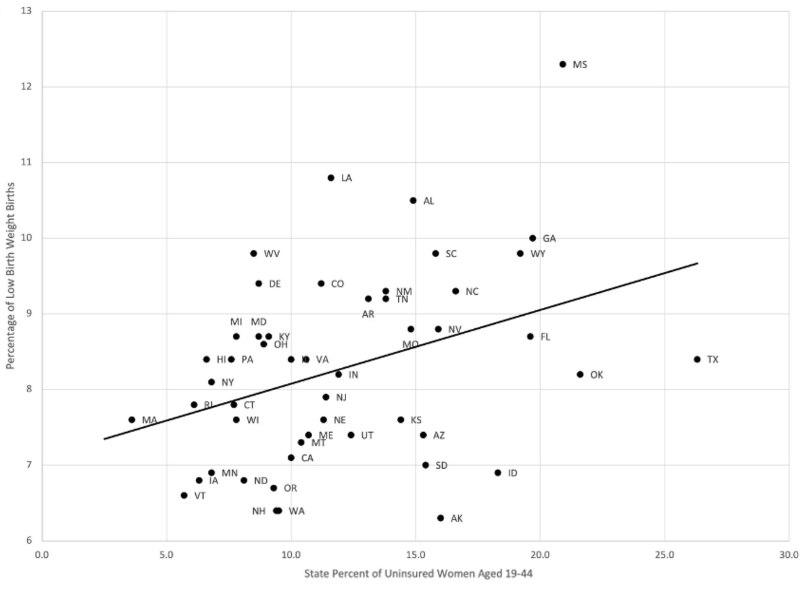The Weight of Women’s Health Insurance
Insurance status is deeply connected to birth weight, with uninsured pregnant women more likely to have a low-birth-weight birth.

Read Time: 2 minutes
Published:
Babies born under 5 pounds, 8 ounces struggle to develop. This puts them at increased risk for obesity, diabetes, heart disease, and cognitive and motor disabilities later in life.
To encourage healthy pregnancies and births, women of reproductive age need access to health services. Health insurance serves as their gateway to care. Women who are not insured by their jobs and cannot afford to buy private insurance may be able to enroll in Medicaid. If not, they will likely remain uninsured and uncared for by medical providers.
Medicaid eligibility varies by state. The Affordable Care Act (ACA) has allowed states to expand their coverage of low-income households; after a decade of the ACA, 17 states have yet to expand. Restrictions on Medicaid access leave 10% of women uninsured prior to pregnancy.
Madeline F. Perry and collaborators examined trends in women’s health insurance coverage and low birth weight. They used insurance data from the Pregnancy Risk Assessment Monitoring System, a mail and telephone survey, and birth certificate data from the National Center for Health Statistics.
The researchers determined each state’s percentage of uninsured women between ages 19 and 44. They compared these rates to each state’s percentage of low-birth-weight births, as shown in the graph below. Each state is shown as a point labeled with the state’s acronym.

At least 12% of women were uninsured in 20 states, including all that have not expanded Medicaid. As shown by the trend line, states with more uninsured women tend to have more low-birth-weight births. The authors found that insurance status impacts birth weight in tandem with individual factors, including age, race, smoking status, and weight.
The researchers call upon states to expand access to Medicaid and social assistance programs that provide cash, food, or vouchers for essential items for healthy pregnancies. They also encourage states to offer tax credits, increased minimum wage, and parental leave, as they have been shown to decrease low birth weight. Expanded insurance coverage will improve access to care, but the health of mothers and their babies is also shaped by circumstances outside of the clinic.
Databyte via M.F. Perry, E. Trasatti, L.M. Yee, and J. Feinglass. The association of state percent uninsured and the likelihood of low birth weight: evidence from the 2016–2019 Pregnancy Risk Assessment Monitoring System. Public Health, 2023.



